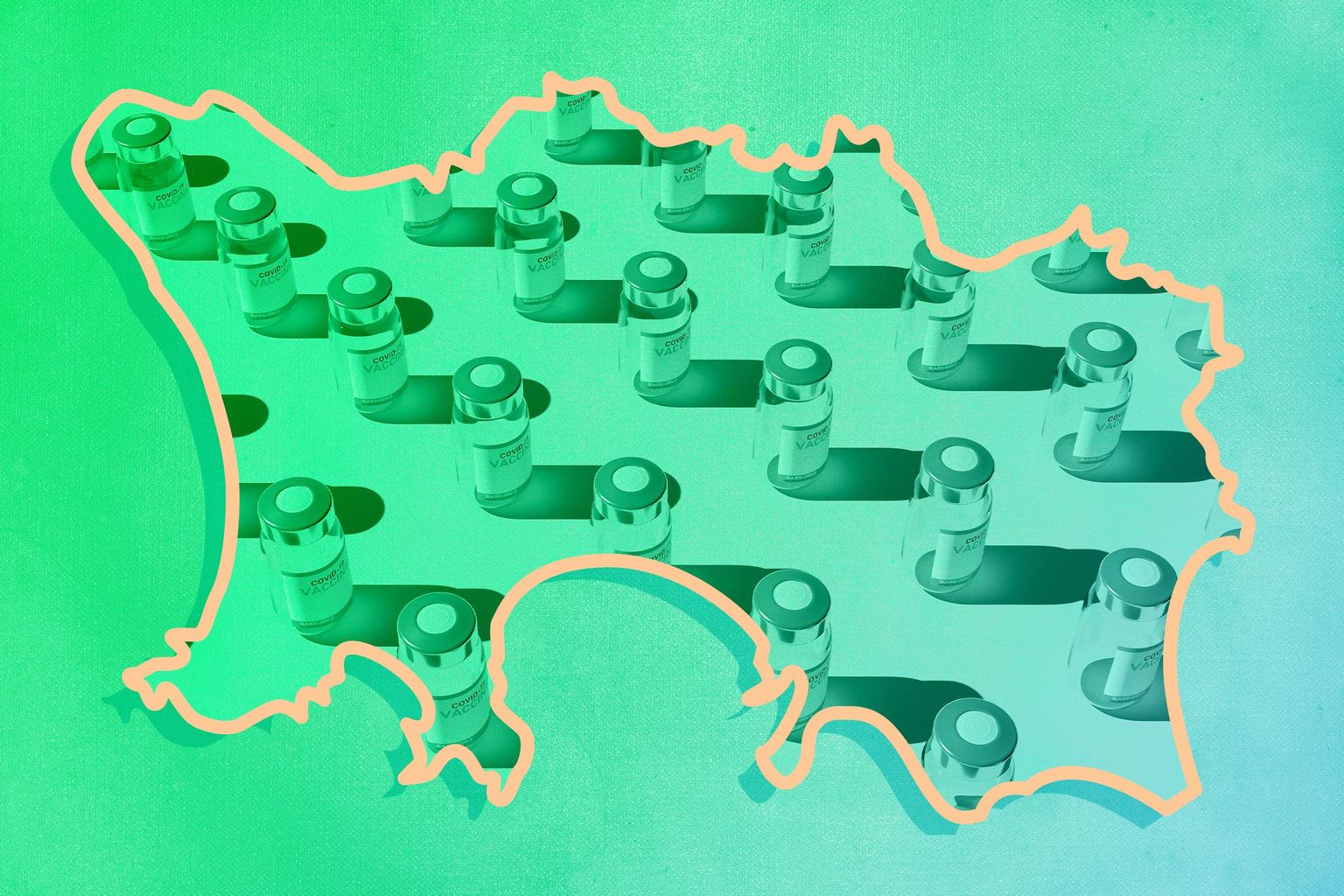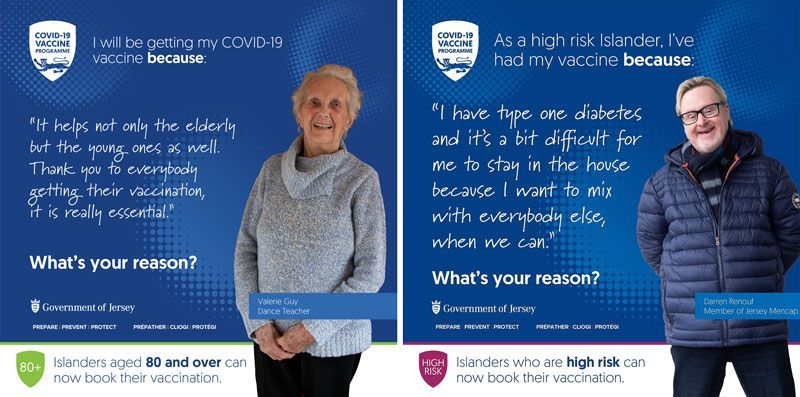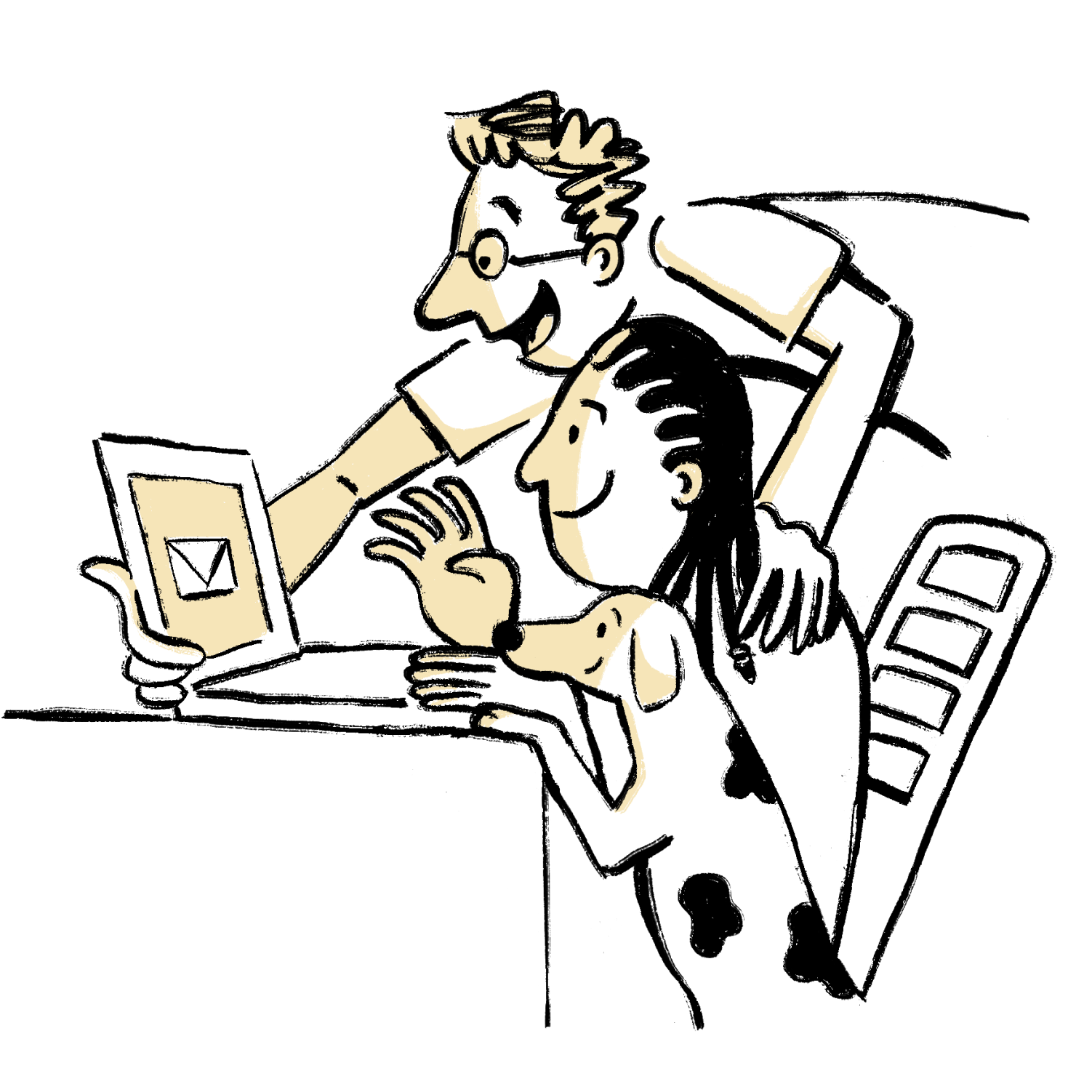How to vaccinate an island, according to science
To build trust in COVID vaccines, the island of Jersey turned to behavioural scientist Steve J. Martin. His advice? Use language, not logic.
- Published
- 20 Feb 2022
- Written by
- Dorian Lynskey
- Categories
- Art & ScienceFor Good
- Reading time
- 10 min

Photo-illustration: Emily Thiang; iStock
Shortly before last Christmas, Steve J. Martin received an urgent call from a man named Alex Khaldi. The two had worked together at Impower, at a consultancy group that specialised in using behavioural science to improve public services. Now Khaldi was the interim director of public health policy for Jersey, a self-governing British dependency off the coast of France. He was preparing to receive the island’s first batch of coronavirus vaccine, and he needed Martin’s help.
“Alex recognised that having a vaccine is a different proposition to getting people to roll up their sleeves and accept it,” says Martin, who works as CEO of the behavioural science consultancy Influence at Work. “There are groups that don’t engage, for all sorts of complex sociological and psychological reasons. And that’s where me and my team came in.”
In early 2019, the World Health Organization (WHO) set about ranking the biggest threats to global health. Vaccine hesitancy came in in the top ten. As the WHO pointed out, vaccines only work if enough people take them to achieve herd immunity. And should vaccination rates ever fall, even formerly eliminated diseases can make a devastating comeback.
That warning was thrown into sharp relief just months later, when a new coronavirus was identified as the cause of a spate of mysterious pneumonia cases in the Chinese city of Wuhan. Early efforts to contain the spread focused on lockdowns and medical interventions, but WHO epidemiologists were already strategising about the problems they might encounter should they have to vaccinate their way out of a potential pandemic. The more contagious the disease, the greater the proportion of the population that needs to be vaccinated to stop its spread. For COVID-19, the epidemiologists later said, that figure was at least 70 per cent.
The good news for Khaldi and Martin was that around two-thirds of Jersey’s 110,000 residents claimed they’d happily accept a vaccine if it kept them safe and helped life get back to normal. The bad news was that a small but significant group of anti-vaxxers also lived on the island. Between the two groups was a large and diverse segment who were squishy and open to persuasion. This was the group Khaldi needed to target.
If Martin could make the people feel like the vaccine was already theirs, they might be more likely to accept it.
“Tackling anti-vax sentiment head-on would be an intuitive thing to do,” Khaldi says, but unlikely to change many minds. For sceptics trying to make decisions about something that affects them personally, and where information and misinformation abounds, logic and reason just don’t cut it—research shows they can even backfire. Instead, Khaldi chose to focus his efforts on the undecided, assuming that “even marginal gains in take-up would provide a very significant effect” to the overall population.
Which is how, in the frantic days before the 2020 Christmas break, he found himself on the phone to Martin, asking how the two of them might do this.
Martin, 55, is something of a social sciences multi-hyphenate: in addition to his CEO duties, he’s also a visiting professor of behavioural science at Columbia University, a guest lecturer at Harvard and the London School of Economics, chair of the Global Association of Applied Behavioural Scientists, and co-author of the 2007 New York Times bestseller Yes! 50 Secrets from the Science of Persuasion. In his years as a behavioural scientist, he’d persuaded people to do everything from attending hospital appointments to paying their taxes on time. Now he was charged with convincing an entire island to ward off a pandemic.
He started by poring over existing health research and working out ways to apply it to Khaldi’s little patch of the real world. He knew that a person’s decision to vaccinate was influenced by a complicated mix of psychosocial, cultural, economic and political factors. According to the WHO, the best way to make sense of these was by looking at “the four Cs”: convenience, complacency, calculation and confidence.
‘Convenience’ meant making vaccination as frictionless as possible. ‘Complacency’ described people who didn’t feel personally at risk of catching the virus, but who could nevertheless be motivated by appeals to the greater good. ‘Calculation’ covered those who weighed up the benefits of vaccination versus the potential risks, while ‘Confidence’ encompassed anyone who had serious doubts about vaccine safety or lacked trust in the government.
“We came up with a cocktail of different ideas aligned to those four categories and customised to Jersey,” Martin says. “The real job was to decide which ones were the most likely to have an effect—and [the most] unlikely to have an unintended consequence. Sometimes something well-established in one domain can really screw up another.”
One study that found South African women were more likely to take health advice from hairdressers than doctors.
The public-health message already at play in Jersey was simple and obvious—protect yourself, protect others, end the pandemic. Martin’s team sought to bolster it by using what behavioural economists called ‘the endowment effect’: a cognitive bias that causes people to value things they own more highly than things they don’t.
Biases are usually something to overcome, but Martin saw a way to use the endowment effect to Jersey’s advantage: if he could make the people feel like the vaccine was already theirs, they might be more likely to accept it. It wasn’t an entirely original idea. A Wharton School professor named Dr Katy Milkman had recently demonstrated that take-up of the winter flu vaccine in the US increased by as much as 11 per cent when public service announcements used the possessive phrases “your vaccine” or “a vaccine has been reserved for you.” An 11 per cent increase may not sound like much, Martin says, but it could be the difference between achieving herd immunity and not. Subsequent Jersey advertisements used the potent phrase “I will be getting my COVID-19 vaccine because…”

Images: Care of the Government of Jersey
Most of Martin’s work, however, was less about what was said than who said it. “My mantra is: the messenger is the message.”
In 2019, Martin had co-authored a second book, Messengers: Who We Listen to, Who We Don’t, and Why. It outlined the difference between what he called “hard” and “soft” messengers. According to Martin, hard messengers are high-status individuals with unusual amounts of power, wealth, intelligence or charisma: think of successful world leaders, Fauci-level scientists or celebrities. Common wisdom dictates they should wield the most influence, as they have the most knowledge, the biggest reach and widest appeal. But Martin believed soft messengers were often preferable precisely because they weren’t exceptional. They’re peers, not leaders. From his perspective, vaccination programs required average Joes, not celebrities or scientists.
“We sometimes forget that you may be the most qualified messenger, but that doesn’t necessarily make you the most effective messenger,” Martin says. He cites one study that found South African women were more likely to take health advice from hairdressers than doctors because they saw hairdressers as “someone like me”. “A lot of people in Jersey weren’t looking for leadership and direction; they were looking for reassurance. Those softer, more connected ‘people like me’ who have got over their feelings of vulnerability are far more effective.”
Jersey’s first priority was vaccinating staff who worked in care homes for the aged, many of them young women who were more worried about the vaccine’s potential impact on, for example, fertility, than they were about catching the virus. Jersey’s governments ran advertisements featuring testimonials from women who had come off the fence and decided to accept the vaccine. Such personal appeals were also used to target other groups. Ordinary people explaining why they had changed their minds had a domino effect on their peers.
“Often they’re not only more influential than someone who’s been convinced from the outset, but more effective than the experts in the white coats,” Martin explains. “That messenger has two characteristics: they have that commonality that makes them legitimate, and they have that enabling feature—if you’re able to do it, then I should be able to do it, too. It brings down potential barriers.”
Despite the short timeframe, Jersey’s Public Health COVID Team had a strategy in place by January. Martin, Khaldi and their colleagues met online with Jersey’s Scientific and Technical Advisory Committee to assess and tweak that strategy based on the latest vaccination figures.
The results have been impressive. By May, the U.K. average for vaccinated aged care staff was around 80 per cent; Jersey’s was 93 per cent. And by August, that number had risen to almost 100 per cent, with 81 per cent of the total population over 18 double vaccinated. This makes Jersey one of the most vaccinated populations in the world. “It’s impossible to draw out the behavioural science component of the results, Khaldi admits. “But my own view is that it’s played an absolutely crucial part.” The Jersey government agrees, and is actively encouraging others to adopt Martin’s strategy. There’s more work to be done, but the early signs are promising, with a growing number of U.S. municipalities already starting to experiment with persuasion techniques of their own.
Martin worries anti-vaxxers may affect the take-up of previously accepted vaccines. Distrust can be viral, too.
For his part, Martin believes his strategy’s three key ideas—personal appeals, endowment and the magic word “because”—can be used to deliver many kinds of messages to many different audiences. But he admits there were local factors working in Jersey’s favour. The U.K. falls in the middle of the global trust index, which measures a nation’s trust in its authorities and fellow citizens. Martin thinks Jersey probably ranks above the national average on this scale. “There’s a unique unity about a small island,” he says. “We did some survey work in February and found that the idea of togetherness and doing it for others was an especially motivating characteristic.” This backs up other studies that show that countries with a greater sense of social cohesion are more likely to support precautionary COVID measures like vaccine programs and social distancing.
Khaldi points out that Jersey’s size relative to the U.K. has also made it easier to enact a coherent strategy, right down to working with local pharmacies. “Steve [Martin] and his team can be precisely involved in the communications and operational processes. But it’s still a work in progress.” He says vaccine hesitancy in Jersey’s younger population, which is proving more stubborn, is their next challenge. Even in Jersey, there are limits to the power of persuasion. Think of it like drilling down through soft earth and then hitting layers of hard rock. Anti-vaxxers experience their own version of the endowment effect: they’ve invested so much energy and credibility in their resistance to vaccines that they’re often extremely reluctant to abandon the cause. Attempts to change their minds tend to backfire, entrenching them even deeper in their opposition.
“I don’t think they’re necessarily lacking in information,” Martin says. “I suspect they’re lacking in trust. The one thing we all are is certainty-seekers. We tend to look for evidence that confirms what we already believe, because it reinforces certainty. We’re not looking for counter-arguments, because uncertainty is an uncomfortable mindset. So it’s challenging.” Exactly how challenging is a matter of debate. “I think we’re chipping away,” Martin says. “Will we ever get there? Probably not.”
Martin worries the increased prominence of anti-vaxxers over the last few months may even affect the take-up of previously accepted vaccines, such as the MMR vaccine that protects children against measles, mumps, and rubella. Distrust can be viral, too. This makes finding the right messengers even more important.
“We’re listening to many more voices today than we would have twenty years ago,” he says, alluding to the Babel of social media. “It’s difficult to determine if someone is a genuine expert. And if I can’t answer that question, then I’ll answer an easier question: Do they seem like they’re like me? That’s the interesting thing about our society now. We are choosing to answer difficult questions by asking ourselves an easier one.”
Politicians and scientists may find it infuriating to be told their hard-won authority and expertise is actually an obstacle to convincing certain people. But Martin’s work suggests that when it comes to getting jabs into reluctant arms, the greatest asset might be an ordinary citizen. Someone who was hesitant themselves, and experienced a change of heart.
